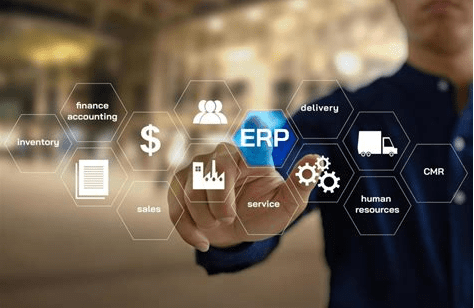Erp solutions small businesses
Welcome, small business owners! In today’s fast-paced digital world, having efficient ERP solutions can make all the difference in the success of your business. From streamlining operations to improving decision-making processes, ERP systems are essential tools for empowering small businesses to compete with larger corporations. In this article, we will explore how small businesses can benefit from efficient ERP solutions and the impact they can have on your bottom line.
Importance of ERP Solutions for Small Businesses
ERP solutions are essential for small businesses as they help streamline operations, increase efficiency, and improve overall productivity. With the right ERP system in place, small businesses can automate manual processes, manage inventory more effectively, track sales and finances accurately, and make informed decisions based on real-time data. By centralizing all business functions into one integrated platform, small businesses can eliminate data silos, reduce errors, and improve collaboration among departments.
Furthermore, ERP solutions provide small businesses with a competitive edge by enabling them to adapt to changing market conditions and customer demands quickly. As small businesses grow, they need systems that can scale with them. An ERP solution can easily accommodate growth by adding new users, modules, or customizations without disrupting operations.
Another key benefit of ERP solutions for small businesses is cost savings. By automating repetitive tasks, reducing manual errors, and improving process efficiency, small businesses can lower operational costs and maximize profitability. Additionally, with better visibility into their operations, small businesses can identify areas for improvement and make strategic decisions to optimize resources.
ERP solutions also offer small businesses greater control over their operations by providing real-time analytics and reporting capabilities. Small business owners can track key performance indicators, monitor inventory levels, analyze sales trends, and generate accurate financial reports with just a few clicks. This insight allows them to make data-driven decisions, identify opportunities for growth, and proactively address challenges before they escalate.
Moreover, ERP solutions help small businesses comply with regulations and industry standards. By centralizing data and implementing robust security measures, small businesses can protect sensitive information, ensure data integrity, and maintain compliance with regulatory requirements. This not only minimizes the risk of fines and penalties but also enhances the reputation and credibility of the business.
In conclusion, ERP solutions play a crucial role in the success of small businesses by enabling them to streamline operations, improve efficiency, and make informed decisions. By investing in an ERP system, small businesses can optimize their processes, reduce costs, enhance visibility, and stay competitive in today’s market. With the right ERP solution, small businesses can scale their operations, adapt to changing market conditions, and achieve sustainable growth.
Key Features to Look for in ERP Solutions for Small Businesses
When it comes to choosing an ERP solution for your small business, there are several key features that you should keep in mind. These features can help ensure that the ERP system you select is the right fit for your business and will help you streamline your operations, improve efficiency, and drive growth. Here are some of the key features you should look for in ERP solutions for small businesses:
1. Scalability: One of the most important features to look for in an ERP solution for a small business is scalability. As your business grows, your ERP system should be able to scale with you, accommodating additional users, transactions, and data without requiring a complete system overhaul. Look for an ERP solution that can grow with your business and adapt to your changing needs over time.
2. Customization: Another key feature to consider when choosing an ERP solution for your small business is the ability to customize the system to meet your specific requirements. Every business is unique, and your ERP system should be able to reflect that. Look for a solution that offers a high degree of customization, allowing you to tailor the system to your business processes, workflows, and reporting needs. This will help ensure that the ERP system is a perfect fit for your business and will help you get the most out of the system.
3. Integration: It’s also important to consider how well an ERP solution integrates with your existing software and systems. The ability to seamlessly integrate with other applications, such as accounting software, CRM systems, and e-commerce platforms, can help you streamline your operations and improve overall efficiency. Look for an ERP solution that offers easy integration options and has a robust API that allows you to connect with other applications in your tech stack.
4. User-friendly interface: A user-friendly interface is essential for any ERP system, but it’s especially important for small businesses that may not have dedicated IT staff to manage the system. Look for an ERP solution that has an intuitive, easy-to-use interface that doesn’t require extensive training to use. This will help ensure that your employees can quickly get up to speed with the system and start reaping the benefits of the ERP system right away.
5. Cloud-based: Cloud-based ERP solutions are becoming increasingly popular among small businesses due to their cost-effectiveness, flexibility, and accessibility. Cloud-based ERP solutions allow you to access your system from anywhere with an internet connection, making it easy for remote and distributed teams to collaborate and work together. Look for a cloud-based ERP solution that offers reliable performance, data security, and regular updates to ensure that your system is always up-to-date and secure.
By considering these key features when choosing an ERP solution for your small business, you can ensure that you select a system that meets your needs, helps you streamline your operations, and drives growth and success for your business.
Benefits of Implementing ERP Solutions for Small Businesses
Implementing an ERP (Enterprise Resource Planning) solution can offer a wide range of benefits for small businesses. These benefits can help streamline processes, increase efficiency, and improve overall productivity. Here are the key benefits of implementing ERP solutions for small businesses:
1. Improved Efficiency and Productivity
One of the main benefits of implementing an ERP solution for small businesses is the improvement in efficiency and productivity. ERP systems can automate various tasks such as data entry, report generation, and inventory management, which can save valuable time and resources. With an ERP system in place, employees can focus on more value-added activities, leading to increased productivity and overall efficiency.
2. Enhanced Data Accuracy and Decision-Making
Another significant benefit of ERP solutions for small businesses is the enhanced data accuracy and improved decision-making capabilities. By centralizing all business data in one system, ERP solutions eliminate the need for manual data entry and reduce the risk of errors. This ensures that businesses have access to real-time, accurate information that can be used to make informed decisions quickly. With access to up-to-date data, small business owners can make strategic decisions that drive growth and profitability.
3. Scalability and Flexibility
ERP solutions are designed to be scalable and flexible, making them ideal for small businesses that are looking to grow and expand. As businesses evolve and change, ERP systems can easily adapt to accommodate new processes, departments, and users. This scalability allows small businesses to customize their ERP solutions to meet their specific needs and requirements, ensuring that the system continues to support business operations as they grow. Additionally, ERP solutions offer a high level of flexibility, allowing businesses to add or remove modules as needed, making it easy to tailor the system to fit changing business demands.
4. Cost-Effectiveness
Implementing an ERP solution for small businesses can also lead to cost savings in the long run. While the initial investment in an ERP system may seem significant, the efficiencies gained from streamlined processes, reduced errors, and improved decision-making can result in significant cost savings over time. By consolidating various business processes into one system, businesses can minimize duplicate efforts and eliminate inefficiencies, ultimately reducing operational costs and improving overall profitability.
In conclusion, implementing an ERP solution can offer small businesses a wide range of benefits, including improved efficiency, enhanced data accuracy, scalability, flexibility, and cost-effectiveness. By leveraging the power of ERP systems, small businesses can optimize their operations, drive growth, and achieve long-term success in today’s competitive market.
Customization Options for ERP Solutions for Small Businesses
When it comes to implementing an ERP solution for a small business, customization options are crucial. Every small business has unique needs and processes, and having the ability to customize an ERP solution allows them to tailor the system to fit their specific requirements. Customization options can range from simple changes to the user interface to more complex modifications to the core functionality of the ERP system.
One common customization option for small businesses is the ability to add or remove modules based on their needs. This allows small businesses to only pay for the features and functionalities that are relevant to their operations, saving them both time and money. For example, a small retail business may not need the manufacturing module that comes with a standard ERP solution, so being able to remove this module can help streamline the system for their needs.
Another important customization option for small businesses is the ability to integrate the ERP solution with other software applications they are already using. This integration can help eliminate duplicate data entry, improve data accuracy, and streamline processes across different departments. For example, a small e-commerce business may want to integrate their ERP solution with their online store platform to automatically update inventory levels and process orders in real-time.
Customization options also extend to the user interface of the ERP system. Small businesses should have the ability to customize the dashboard, reports, and workflows to match their specific preferences and workflows. This can help employees navigate the system more easily and increase user adoption, leading to a more successful implementation of the ERP solution.
Furthermore, small businesses should look for ERP solutions that offer flexibility in terms of deployment options. While some small businesses may prefer to have their ERP system hosted on-premises for data security reasons, others may opt for a cloud-based solution for easier access and scalability. Having the choice between different deployment options allows small businesses to select the option that best fits their needs and budget.
In conclusion, customization options are essential for small businesses when considering an ERP solution. The ability to tailor the system to their unique needs and processes can help small businesses improve efficiency, productivity, and overall success. By selecting an ERP solution with robust customization options, small businesses can create a tailored system that aligns with their business goals and objectives.
How ERP Solutions Can Help Small Businesses Grow
ERP solutions play a crucial role in helping small businesses grow by streamlining processes, increasing efficiency, and improving overall productivity. Here are five ways in which ERP solutions can benefit small businesses:
1. Improved Efficiency
One of the key advantages of implementing an ERP solution in a small business is the increased efficiency it brings to day-to-day operations. By automating tasks such as data entry, inventory management, and financial reporting, small businesses can save time and resources that can be allocated to more strategic activities.
2. Better Decision-Making
ERP solutions provide small businesses with real-time data and analytics that can help them make informed decisions. By having access to accurate and up-to-date information on sales, inventory levels, and customer preferences, small business owners can make better decisions that drive growth and profitability.
3. Scalability
As small businesses grow, their needs evolve, and they require a scalable solution that can grow with them. ERP solutions are designed to be scalable, meaning that they can adapt to the changing needs of a growing business without the need for a complete system overhaul. This scalability ensures that small businesses can continue to operate efficiently as they expand.
4. Integration
ERP solutions integrate various business functions such as finance, human resources, and supply chain management into a single platform. This integration streamlines processes, reduces data silos, and improves communication between different departments, leading to increased collaboration and synergy within the organization.
5. Enhanced Customer Experience
One often overlooked benefit of ERP solutions for small businesses is the improvement in customer experience. By centralizing customer data and interactions, small businesses can provide personalized services, increase customer satisfaction, and ultimately build long-lasting relationships with their customers. Additionally, ERP solutions enable businesses to analyze customer data and trends, allowing them to anticipate customer needs and tailor their offerings accordingly.
In conclusion, ERP solutions are a valuable asset for small businesses seeking to grow and succeed in today’s competitive market. From increased efficiency and better decision-making to scalability, integration, and enhanced customer experience, ERP solutions offer a wide range of benefits that can help small businesses thrive and reach their full potential.







